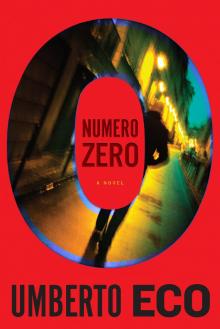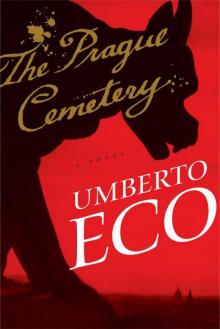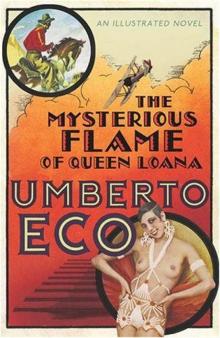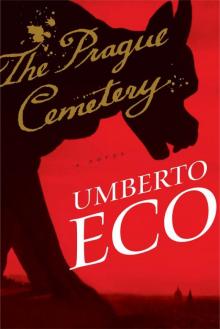- Home
- Umberto Eco
The Mysterious Flame Of Queen Loana Page 5
The Mysterious Flame Of Queen Loana Read online
Page 5
The other night Paola took me to a restaurant. "Don’t worry, they know you. Just ask for the usual." Much ado: How are you Dottore Bodoni, we haven’t seen you for a long time, what will we be having this evening? The usual. There’s a man who knows what he likes, the owner crooned. Spaghetti with clam sauce, grilled seafood plate, Sauvignon Blanc, then an apple tart.
Paola had to intervene to prevent me from asking for seconds on the fish. "Why not, if I like it?" I asked. "I think we can afford it, it doesn’t cost a fortune." Paola looked at me abstractedly for a few seconds, then took my hand and said: "Listen, Yambo, you’ve retained all your automatisms, and you have no problems using a knife and fork or filling a glass. But there’s something we acquire through personal experience, gradually, as we become adults. A child wants to eat everything that tastes good, even if it will give him a stomachache later. His mother explains over time that he must control his impulses, just as he must when he needs to pee. And so the child, who if it were left up to him would continue to poop in his diapers and to eat enough Nutella to land him in the hospital, learns to recognize the moment when, even if he doesn’t feel full, he should stop eating. As we become adults, we learn to stop, for example, after the second or third glass of wine, because we remember that when we drank a whole bottle we didn’t sleep well. What you have to do, then, is reestablish a proper relationship with food. If you give it some thought, you’ll figure it out in a few days. In short, no seconds."
"And a calvados, I presume," said the owner as he brought the tart. I waited for a nod from Paola, then replied, "Calva sans dire." I could tell he was familiar with my wordplay, because he repeated, "Calva sans dire." Paola asked me what calvados called to mind, and I replied that it was good, but that was all I knew.
"And yet you got drunk on it during that Normandy trip… Don’t worry, it takes time. In any case, the usual is a good phrase, and there are lots of places around here where you can go in and say the usual, and that should help you feel comfortable."
"It’s clear by now that you know how to deal with traffic lights," Paola said, "and you’ve learned how fast cars go. You should try taking a walk by yourself, around the Castello and then into Largo Cairoli. There’s a gelateria on the corner; you love gelato and they practically live off you. Try asking for the usual."
I did not even have to say it-the man behind the counter immediately filled a cone with stracciatella: Here’s your usual, Dottore. If stracciatella was my favorite, I can see why: it is excellent. Discovering stracciatella at sixty is quite pleasant. What was that joke Gianni told me about Alzheimer’s? The great thing about it is that you’re always getting to meet new people.
New people. I had just finished the gelato, throwing away the last part of the cone without eating it-why? Paola later explained that it was an old habit; my mother had taught me as a child that you shouldn’t eat the tip because that’s where the vendor, back in the days when they sold gelato from carts, held it with his dirty fingers-when I saw a woman approaching. She was elegant, around forty or so, with a slightly brazen demeanor. The Lady with an Ermine came to mind. She was already smiling at me from a distance, and I got a nice smile ready too, since Paola had told me my smile was irresistible.
She came up to me and took hold of both my arms: "Yambo, what a surprise!" But she must have noticed something vague in my expression; the smile was not enough. "Yambo, don’t you recognize me? Do I look that much older? Vanna, Vanna…"
"Vanna! You’re more beautiful than ever. It’s only that I’ve just been to the eye doctor, and he put something in my eyes to dilate my pupils. My vision will be blurry for a few hours. How are you, Lady with an Ermine?" I must have said that to her before, because I had the impression that she got a little misty-eyed.
"Yambo, Yambo," she whispered, caressing my face. I could smell her perfume. "Yambo, we lost touch. I always wanted to see you again, to tell you that it might have been brief-perhaps that was my fault- but I’ll always have the fondest memories. It was… lovely."
"It was beautiful," I said, with some feeling, with the air of a man recalling his garden of delights. Superb acting. She kissed me on the cheek, whispered that her number had not changed, and left. Vanna. Apparently a temptation I had been unable to resist. What scoundrels men are! With De Sica. But goddamn, what good is it to have had an affair if later you cannot even-I am not talking about telling your friends, but should you not at least be able to savor it now and then, as you lie snug beneath your covers on a stormy night?
Since the first night, as we lay beneath the covers, Paola had lulled me to sleep by stroking my hair. I liked feeling her beside me. Was that desire? Eventually I overcame my embarrassment and asked her if we still made love. "In moderation, mostly out of habit," she said. "Do you feel the urge?"
"I don’t know. As you know, I still don’t have many urges. But I wonder…"
"Don’t wonder, try to get some sleep. You’re still weak. And besides, I certainly don’t want you making love with a woman you’ve just met."
"Affair on the Orient Express."
"Yikes, this isn’t a Dekobra novel."
3. Someone May Pluck Your Flower
____________________
I know how to get around outside, have even learned how to act when people greet me: you gauge your smile, your gestures of surprise, your delight or courtesy by observing the other person’s smiles, gestures, and courtesies. I tried it out on neighbors, in the elevator. Which proves that social life is mere fiction, I said to Carla when she congratulated me. She said this incident is making me cynical. Of course, if you didn’t start thinking it was all playacting, you might shoot yourself.
Now then, Paola said, it’s time you went back to the office. Go by yourself, visit with Sibilla, and see what feelings your place of work inspires. Gianni’s whisper about the beautiful Sibilla came back to me.
"Who’s Sibilla?"
"She’s your assistant, your girl Friday. She’s fantastic and has kept the studio running these past few weeks. I called her today and she was quite proud of having made some amazing sale or other. Sibilla-don’t ask me her last name because nobody can pronounce it. A Polish girl. She was majoring in library science in Warsaw, and when the regime there began to crumble, even before the fall of the Berlin Wall, she managed to get a permit to come study in Rome.
She’s sweet, maybe too sweet, she must have figured out how to win some bigwig’s sympathy. In any case, once she got here she started looking for a job and never went back. She found you, or you found her, and she’s been your assistant for nearly four years now. She’s expecting you today, and she knows what happened and how she should behave."
She gave me the address and phone number of my office. After Largo Cairoli feeds into Via Dante and before you get to the Loggia dei Mercanti-you can tell it’s a loggia from a distance-you turn left and you’re there. "If you have trouble, go into a café and call her, or me, and we’ll send a team of firemen, but I don’t think it will come to that. Oh, bear in mind that you started off speaking French with Sibilla, before she learned Italian, and you never stopped. A little game between the two of you."
So many people in Via Dante. It feels good to pass by a series of strangers without being obliged to greet them, it gives you confidence, makes you realize that seven out of ten people are in the same condition you are. After all, I could be someone who is new to the city, who feels a little alone but is getting his bearings. Except that I am new to the planet. Some man waved hello from a café door, no call for theatrical recognition, I waved back and it went smoothly.
I found the street and my studio like the boy scout who wins the treasure hunt: a sober plaque on the ground floor said STUDIO BIBLIO. I must not have much imagination, though I suppose the name sounds serious-what was I supposed to call it, Roman Holiday? I rang, went up the stairs, saw a door that was already open, and Sibilla on the threshold.
"Bonjour, Monsieur Yambo… pardon, Monsieur Bodoni…" As if it w
ere she who had lost her memory. She was indeed quite beautiful. Long, straight blond hair that framed the perfect oval of her face. Not a trace of makeup, except perhaps for a slight touch of something around the eyes. The only adjective that came to mind was darling. (I am dealing in stereotypes, I know, but it is thanks to them that I have been getting by.) She was wearing a pair of jeans and one of those T-shirts with an English message on it, SMILE or something like that, which emphasized, modestly, two adolescent breasts.
We were both embarrassed. "Mademoiselle Sibilla?" I asked.
"Oui," she answered, then quickly: "ohui, houi. Entrez."
Like a delicate hiccup. The first "oui," uttered almost normally, was quickly followed by the second, which caught briefly in her throat as she was breathing in, then the third, as she exhaled again, with the faintest quizzical tone. The overall effect was of childish embarrassment and at the same time a sensual timidity. She stepped aside to let me come in. I noted a tasteful perfume.
If I had had to explain what a book studio was, I would have described something much like what I now saw. Bookcases of dark wood, filled with antique volumes, and more old books on the heavy, square table. A little desk in a corner, with a computer. Two colorful maps on either side of a window with opaque glass. Soft light, broad green lampshades. Through a door, a long narrow storage room-it seemed to be a workroom for packing and shipping books.
"So you must be Sibilla? Or should I say Mademoiselle something-I’m told you have an unpronounceable last name."
"Sibilla Jasnorzewska, yes, here in Italy it causes some problems. But you’ve always just called me Sibilla." I saw her smile for the first time. I told her I wanted to get my bearings, wanted to see our prize books. That wall in the back, she said, and she went over to show me the correct bookcase. She walked silently, brushing the floor with her tennis shoes. But maybe it was the moquette that muted her steps. There hangs, adolescent virgin, a sacred shadow over you, I was about to say aloud. Instead I said: "Who wrote that, Cardarelli?"
"What?" she said, turning her head, her hair twirling. "Nothing," I said. "Let’s see what we have."
Lovely volumes with an ancient air. Not all of them had a title label on the spine. I took one from the shelf. Instinctively I opened it to look for the title page, but I did not find one. "Incunabulum, then. Sixteenth-century blind-tooled pigskin binding." I ran my hands over the sides, feeling a tactile pleasure. "Headcaps slightly worn." I flipped through the pages, touching them to see whether they squeaked, as Gianni had said. They did. "Wide, clean margins. Ah, minor marginal staining on the endpapers, the last signature is wormed, but it doesn’t affect the text. Lovely copy." I turned to the colophon, knowing it was called that, and slowly sounded out: "Venetiis mense Septembri… fourteen hundred ninety-seven. Could it be…" I turned to the first page: Iamblichus de mysteriis Aegyptiorum… It’s the first edition of Ficino’s Iamblichus, isn’t it?"
"It’s the first… Monsieur Bodoni. You recognize it?"
"No, I don’t recognize anything, you’ll have to learn that, Sibilla. It’s just that I know that the first Iamblichus translated by Ficino is from 1497."
"Forgive me, I’m trying to get used to it. It’s just that you were so proud of that copy, it’s really splendid. And you said that for now you weren’t going to sell it, there are so few around-we’d wait for one to appear in some American catalogue, since they’re so good at jacking up prices, and then list ours."
"So I’m a canny businessman, then."
"I always said it was an excuse, that you wanted to keep it to yourself awhile, so you could look at it now and then. But since you did decide to sacrifice the Ortelius, I have some good news."
"Ortelius? Which one?"
"The 1606 Plantin, with 166 color tables and the Parergon. Period binding. You were so pleased to have discovered it when you bought Commendatore Gambi’s entire library on the cheap. You finally decided to put it in the catalogue. And while you… while you weren’t well, I managed to sell it to a client, a new one. He didn’t seem like a real bibliophile to me, more like someone who buys as an investment because he’s heard that antiquarian books appreciate quickly."
"Too bad, a wasted copy. And… how much?"
She seemed afraid to say the amount; she got a form and showed it to me. "In the catalogue we put ‘price on request,’ and you were prepared to deal. I immediately named the highest price, and he didn’t even try to bargain, just signed a check and was off. ‘On the nail,’ as they say in Milan."
"We’ve reached these levels now…" I didn’t have a sense of current prices. "Well done, Sibilla. How much did it cost us?"
"Basically nothing. That is, with the rest of the books from the Gambi library we’ll easily make back, little by little, the lump sum we paid for the whole lot. I took care of depositing the check in the bank. And since there was no price listed in the catalogue, I think that with Mr. Laivelli’s help we’ll come out quite well on the financial side."
"So I’m one of those who don’t pay their taxes?"
"No, Monsieur Bodoni, you just do what your fellow dealers do. For the most part, you have to pay the full amount, but with certain fortunate deals you might, how do you say, round down. But you’re ninety-five percent honest as a taxpayer."
"After this deal it’ll be fifty percent. I read somewhere that citizens should pay every penny of their taxes." She looked humiliated. "Don’t worry about it, though," I said paternally. "I’ll talk it over with Gianni." Paternally? Then I said, almost brusquely, "Now let me take a look at some of the other books." She turned around and went to sit at her computer, silent.
I looked at the books, flipped through their pages: Bernardino Benali’s 1491 Commedia, a 1477 edition of Scot’s Liber Phisionomiae, a 1484 edition of Ptolemy’s Quadripartite, a 1482 Calendarium by Regiomontanus. Nor was I exactly lacking when it came to later centuries: there was a fine first edition of Zonca’s Novo teatro, and a marvelous Ramelli… I was familiar with each of these works, like every antiquarian who knows the great catalogues by heart. But I did not know I owned copies of them.
Paternally? I was pulling out books and putting them back, but in fact I was thinking about Sibilla. Gianni had given me that hint, clearly mischievous, and Paola had delayed telling me about her until the last minute, and had used certain phrases that were almost sarcastic, even if her tone was neutral-"maybe too sweet," "a little game between the two of you"-nothing particularly rancorous, but she seemed a hairsbreadth away from calling her a slyboots.
Could I have had an affair with Sibilla? The lost maiden newly arrived from the East, wide-eyed and curious, meets an older gentleman (though I was four years younger when she got here) and falls under his spell, after all he is the boss and knows more about books than she does, and she learns, hangs on his every word, admires him; and he has found his ideal pupil-beautiful, smart, with that hiccupped oui oui oui-and they begin working together, all day every day, alone in this studio, partners in so many trouvailles great and small; and one day they brush against each other by the door and in that instant the story of their affair begins. But me, at my age? You’re just a girl, go find a boy your own age for God’s sake, don’t take me so seriously. And she: No, I’ve never felt anything like this before, Yambo. Was I summarizing some movie everyone knows? And it goes on like a movie, or a romance novel: I love you, Yambo, but I can’t go on looking your wife in the eye, she’s so dear and kind, and you have two daughters and you’re a grandfather-Thanks for reminding me that there’s a whiff of the corpse about me already-No, don’t talk that way, you’re more… more… more than any man I’ve ever met, boys my age make me laugh, but maybe it’s right that I should leave-Wait, we can still be good friends, just seeing each other every day will be enough-But don’t you see, that’s just it, if we see each other every day we could never remain friends-Sibilla, don’t say that, let’s think this through… One day she stops coming to the studio, I call her and say I’m going to kill myself, and s
he says don’t be infantile, tout passe, then later she is the one who comes back, unable to stay away. And it goes on like that for four years. Or does it end?
I seem to know all the clichés, but not how to put them together in a believable way. Or else these stories are terrible and grandiose precisely because all the clichés intertwine in an unrealistic way and you can’t disentangle them. But when you actually live a cliché, it feels brand-new, and you are unashamed.
Would it be a realistic story? In recent days I felt that I no longer had desires, but as soon as I saw her I learned what desire is. I mean, someone I just met for the first time. Imagine being around her every day, following her, seeing her glide around you as if she were walking on water. Of course this is mere speculation; I would never start something, in the state I am in now, something like that, and besides, with Paola, I would really be the prize swine. For me, this girl might as well be the Immaculate Virgin, I cannot even think it. Great. But for her?
She might still be in mid-affair, maybe she wanted to greet me with tu and my first name; fortunately in French you can use vous even when you are sleeping together. Maybe she wanted to throw her arms around my neck-who knows how much she too might have suffered in recent weeks-and here she sees me come along, pretty as you please, saying how do you do Mademoiselle Sibilla, and now won’t you leave me to my books, very kind of you thanks. And she understands that she can never tell me the truth. Perhaps it is better like this, time she found herself a boy. And me?
That I am not quite all here is a matter of clinical record. What am I brooding on about? With me sharing my office with a beautiful girl, of course Paola would play the part of a jealous wife-that is just a game old married couples play. And Gianni? It was Gianni who spoke of the beautiful Sibilla, maybe he is the one who has fallen for her, maybe he drops by my office all the time with some tax excuse, then hangs around pretending to be enchanted by the squeaking pages. He is the one with the crush, I have nothing to do with it. It is Gianni, old enough to smell a little like a corpse himself, he is trying to steal away, has stolen away, the woman of my dreams. Here we go again: the woman of my dreams?

 Baudolino
Baudolino The Name of the Rose
The Name of the Rose Chronicles of a Liquid Society
Chronicles of a Liquid Society Inventing the Enemy: Essays
Inventing the Enemy: Essays Foucault's Pendulum
Foucault's Pendulum How to Travel With a Salmon & Other Essays
How to Travel With a Salmon & Other Essays Numero zero
Numero zero The Island of the Day Before
The Island of the Day Before UMBERTO ECO : THE PRAGUE CEMETERY
UMBERTO ECO : THE PRAGUE CEMETERY On the Shoulders of Giants
On the Shoulders of Giants Misreadings
Misreadings Six Walks in the Fictional Woods
Six Walks in the Fictional Woods The Mysterious Flame Of Queen Loana
The Mysterious Flame Of Queen Loana The Prague Cemetery
The Prague Cemetery On Literature
On Literature Lost structure
Lost structure